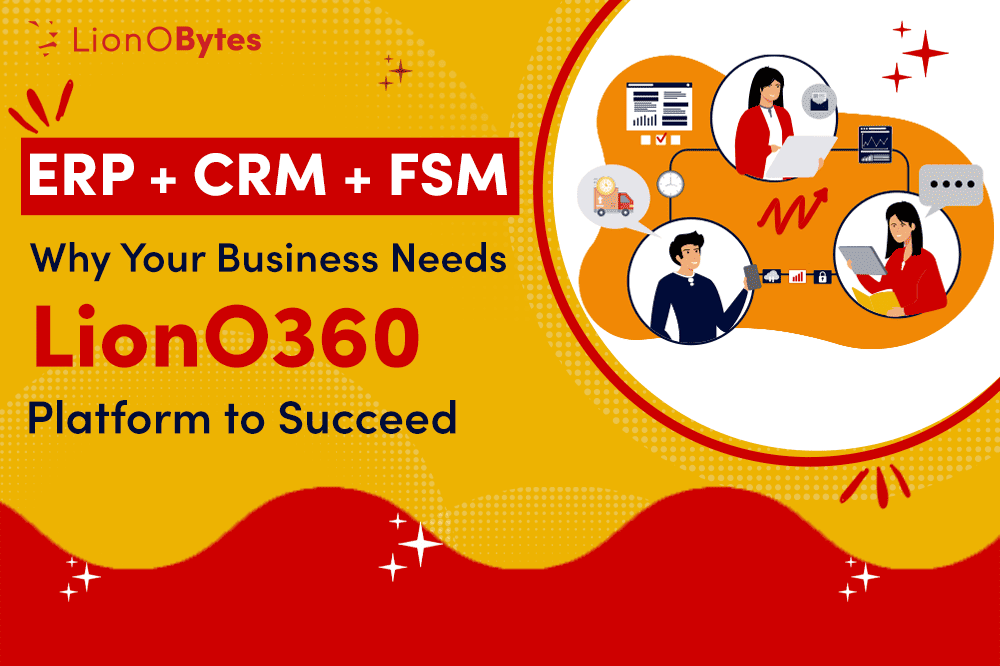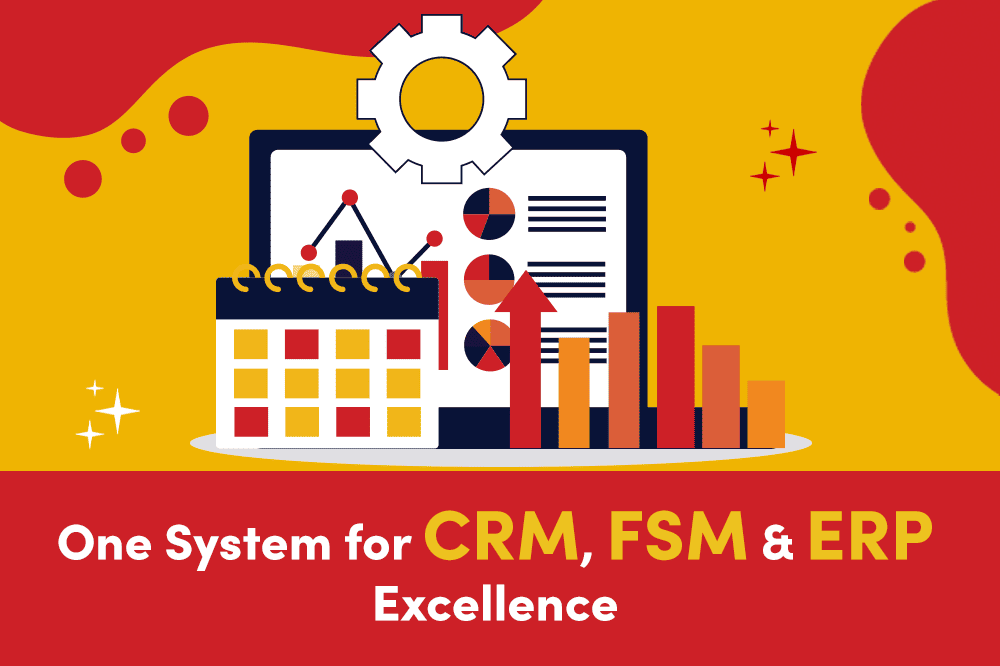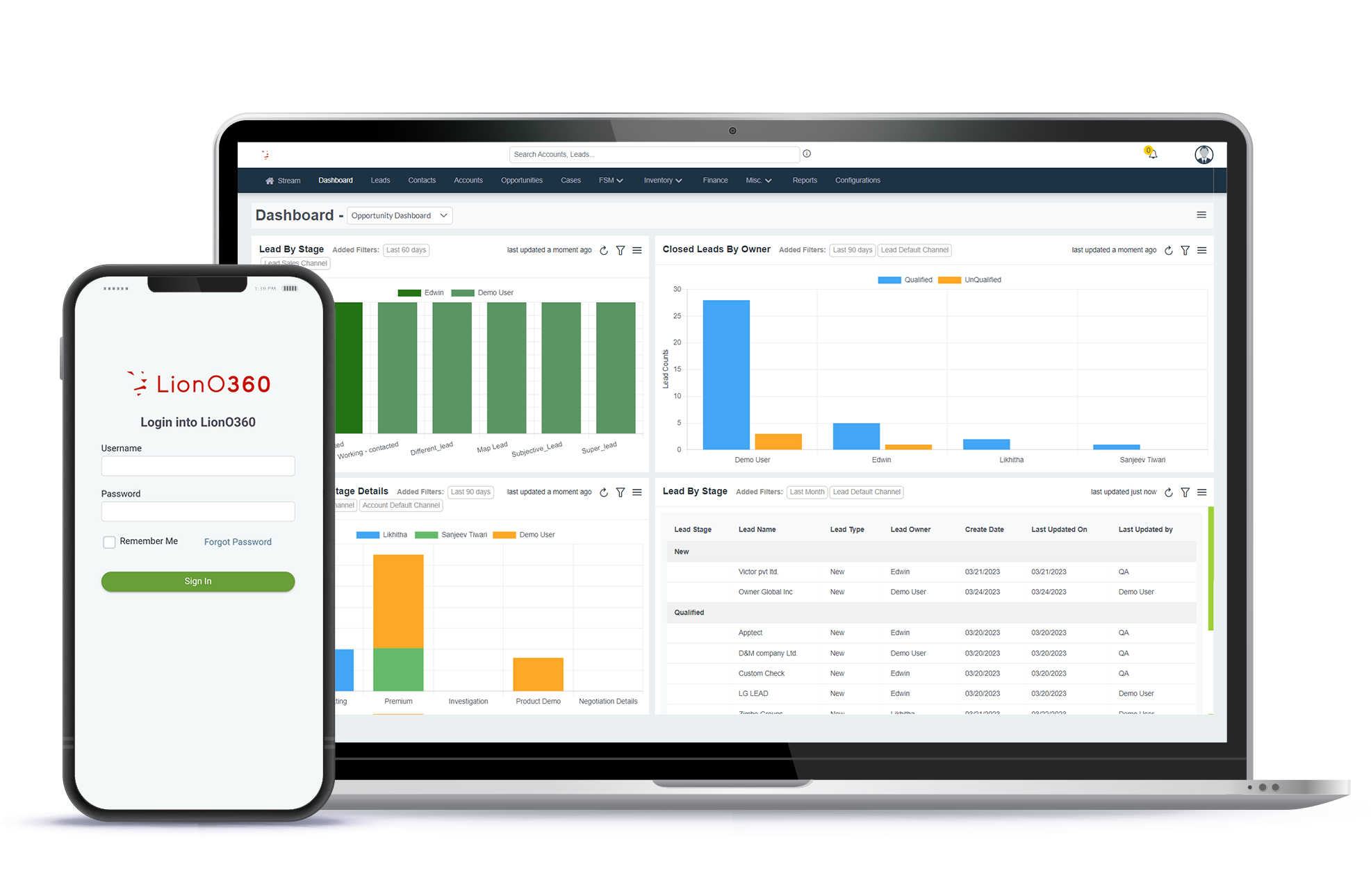
CRM, FSM and ERP are integral parts of modern business strategy. CRM amplifies the effectiveness of customer relationships; FSM optimizes on-site management; and ERP is the glue that binds all core business processes into one seamless, integrated master-process. Collectively, these systems lead to improved efficiency, better decision-making, and the capability to grow and scale in line with overall corporate strategic goals. With CRM, FSM, and ERP forming the pillars of modern, efficient enterprises, LionOBytes plays the crucial role of bringing these technologies in sync with the global business ecosystem. It empowers businesses to deliver excellent customer experiences, optimize operations, operate seamlessly across locations, adapt with agility, and scale sustainably, all with home-grown support and real value.
The combined FSM–CRM–ERP market is growing rapidly, with service integration projected to reach US$6.51 billion by 2026 at a CAGR of 15.7%. This blog post tells a detailed understanding of all three platforms and how LionO360 is necessary for business growth.
Customer Relationship Management (CRM)
Customer Relationship Management, commonly known as CRM, is a tool that comes with a strategy to help businesses manage their existing and potential customers. Through a CRM products, organizations can store customer contact information, track customer interactions, manage leads, and follow up on opportunities. Centralized data makes it easier for sales, marketing, and customer support teams to provide consistent, personalized service to customers.
Field Service Management (FSM)
FSM (Field Service Management) refers to the coordination and optimization of field operations. It includes scheduling technicians, dispatching work orders, managing inventory of parts or equipment, and tracking work progress in real time. For companies that depend on servicing equipment, installations, or onsite support—such as utilities, telecommunications, healthcare, or equipment repair—FSM ensures that the right person reaches the right place at the right time, with the right tools.
Enterprise Resource Planning (ERP)
ERP is an excellent software solution that integrates all business processes into a unified system. These processes include finance, human resources, procurement, manufacturing, sales, inventory control, and supply chain management. Data flows freely across departments, promoting collaboration, eliminating silos, and enabling better decision-making based on real-time information.
How CRM, FSM, and ERP Are Necessary for Your Business

1. Better Customer Experience and Loyalty
By having a detailed record of every interaction, companies can anticipate needs, tailor communication, and build strong relationships. Happy customers are more likely to come back, recommend the business, and increase the lifetime value.
2. Efficient Field Operations and Reduced Costs
In businesses where onsite visits are necessary, FSM plays a vital role. It removes guesswork from scheduling and resource allocation, improves technician productivity, and minimizes travel time and fuel costs. Faster response times also lead to higher customer satisfaction and lower service costs overall.
3. Streamlined Operations Across the Organization
ERP brings every department onto one platform. It prevents duplication of work, reduces manual errors, and accelerates workflows. Finance teams get timely and accurate data, production follows inventory levels, HR manages payroll efficiently, and procurement avoids overstock or stockouts.
4. Data-Driven Decisions and Insights
With CRM, FSM, and ERP, you can collect data from multiple touchpoints—customer interactions, field visits, financial transactions, and inventory movements. This data, when analyzed, reveals trends, inefficiencies, and opportunities.
5. Scalability and Future-ready Growth
As businesses grow, processes become more complex. CRM, FSM, and ERP systems scale with organizational needs. Whether expanding into new regions, adding service lines, or growing team strength, these solutions adapt, ensuring that growth does not come at the cost of operational chaos.
Why LionO360 Stands Out: The Importance & Contributions
LionOBytes is a company that offers sophisticated, integrated digital solutions as LionO360, focusing on integrate ERP CRM FSM functionalities made for all businesses. Here is why LionOBytes matters and how it contributes:
1. Localized Solutions with Deep Understanding
Unlike many global software providers, LionOBytes understands the business context—the regulatory environment, linguistic preferences, regional variations, and everyday challenges. Its solutions address real-world needs like regional tax structures, multilingual support, and scalable pricing for small and medium enterprises.
2. Seamless Integration of CRM, FSM, and ERP
LionOBytes does not treat CRM, FSM, and ERP as separate silos. It provides a unified platform where customer data, field operations, and enterprise resources connect fluidly. For instance, a service request logged in the CRM can automatically generate a field service assignment, which updates inventory and billing in the ERP—all within one system.
3. Agile Implementation and User-friendly Interface
LionOBytes emphasizes easy onboarding and intuitive use. Its interface is clean, requires minimal training, and focuses on workflows that frontline staff can adopt quickly. It lowers resistance to change, ensures faster return on investment, and keeps employees motivated.
4. Cost-Effective Pricing Models
Recognizing the budget constraints of businesses, especially SMEs, LionOBytes offers flexible pricing—pay-as-you-grow, modular subscriptions, and predictable pricing. It ensures that you pay only for features you need.
5. Support and Local Expertise
LionOBytes offers locally based customer support, which means quicker response, better understanding of the business environment, and availability during business hours. Many USA businesses struggle with time zone differences when working with international providers. LionOBytes adequately fills that gap.
6. Continuous Innovation and Updates
The digital world evolves rapidly. LionOBytes invests in continuous improvement—adding new features like mobile-first field service interfaces, analytics dashboards tailored for global users, and compliance updates (for example, GST changes). This ensures your systems remain current and powerful.
7. Building Trust with Transparency
Trust matters. LionOBytes builds trust by being transparent about data handling, privacy, and costs. It offers clear service level agreements, term outlines, and openly shares roadmap features. This reassures business owners that they are in control of their data and cost structure.
Why Choose LionOBytes: Key Features and Benefits

LionOBytes is all in one software and far better than other brands. It is empowering businesses to modernize, compete, and grow. Here are several valuable ways:
- Empowerment through Access: It allows companies with limited budgets to adopt technologies once only available to larger enterprises.
- Bridging Gaps: By integrating CRM, FSM, and ERP, it removes barriers between customer management, field operations, and internal processes—creating one cohesive experience.
- Supporting Growth: With scalable pricing and modular design, businesses can grow their system as they grow their operations, avoiding wasted investments.
- Building Digital Resilience: In uncertain times, having reliable, integrated digital operations helps businesses adapt swiftly—whether to regulatory changes, demand shifts, or supply disruptions.
- Fostering Trust: Transparent pricing, privacy policies, and local support mean businesses trust LionOBytes as a partner, not just a vendor.
- • Driving Innovation: By keeping the platform updated with mobile tools, analytics dashboards, and compliance features, LionOBytes keeps businesses at the forefront of digital transformation.
Connect with our experts today. Call +1 (609) 281-5272 to schedule your free demo.
Frequently Asked Questions
1. What are CRM, FSM, and ERP?
CRM manages relationships and communications with customers. FSM focuses on managing operations in the field—such as dispatching technicians and tracking service work. ERP integrates and streamlines all core business processes across departments, such as finance, HR, procurement, inventory, manufacturing, and sales. While each serves a distinct purpose, integrating them delivers greater efficiency and a unified view of business operations.
2. How does CRM benefit my business specifically in the context?
CRM helps businesses build strong customer relationships by centralizing customer data and communication. It enables personalized follow-ups, tracks customer preferences, supports local languages, and adapts to regional tax and compliance norms. That leads to increased customer satisfaction, repeat business, and referral growth.
3. How does Enterprise Resource Planning improve operational efficiency?
ERP connects various departments on a single platform, ensuring data flows smoothly across operations. This reduces manual errors, eliminates duplicate entries, standardizes processes, and improves visibility into finances, inventory, human resources, purchasing, and production. Real-time information supports faster, more intelligent decision-making and enhances overall business agility.
4. What specific advantages does LionOBytes offer over other similar platforms?
LionOBytes' understanding of regional tax regulations, business customs, and flexibility makes it especially suited to SMEs that may find global solutions complex or expensive.







